The Pleasure Dome
Monty PythonBlackadder
Red Dwarf
Are You Being Served
Fry and Laurie
Young Ones
Father Ted
Peter Cook
Dudley Moore
E.L. Wisty
Oscar Wilde
-
Poetry
The Fuscos
Rude Star Wars...
Did You Know...
What Not to Say...
Autographs
About Me
Home


Oscar Wilde, 1854-1900

Biography
(from: WWW Cemetery @ http://www.io.org/cemetery/Overview.html)Oscar Wilde was born in 1854 and grew up in an intellectually bustling Irish household. His mother was a poet who wrote under the pen name Speranza and who had a considerable following; his father was a renowned physician with an
interest in myths and folklore.
At Oxford he won a coveted poetry award and came under the influence of the late nineteenth century aesthetic movement. He found its notions of "art for art's sake" and dedicating one's life to art suitable to his temperment and talents. Oscar had a desire to make himself famous and set off to London to do just that.
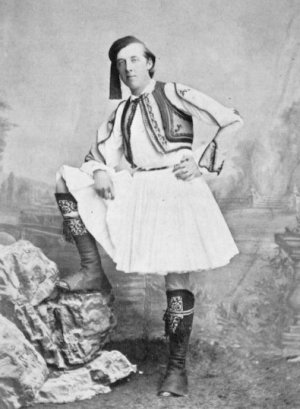
From 1878 to 1881 Oscar Wilde became well known for being well known despite having any substantial acheivements to
build on. He insinuated himself into the class of people he labelled as "the beautiful people", wore outrageous clothes, passed himself off as an art critic and aesthete, and built a reputation for saying shocking things and doing amusing ones. If one tells the truth, one is sure sooner or later to be found out. His natural wit and good humour endeared him to the art and theater world and through his lover Frank Miles he found easy entry into the cliques that frequented London's theater circuit and drawing rooms.
He became a much-desired all-purpose party guest and, with his velvet coat, knee breeches, silk stockings, pale green tie, cane, shoulder-length hair, loose silk shirts and the lily he occasionally carried through Picadilly Circus, much talked about and satirized. His popularity and flamboyance led to his being choosen as an advance publicity man for a new Gilbert and Sullivan operetta, Patience, that spoofed aesthetes like himself, and which paid him one third of the box office receipts.
In 1882 he arrived in New York City and began a year long tour of North America. When a customs inspector asked him if he had anything to declare he replied, "Nothing but my genius." At 28 he lectured in 70 American cities on the arts
and literature. His performances were as wildly popular as his audiences were varied: he spoke to Mormons in Salt Lake
City, silver miners in Colorado, West Coast literati in San Francisco, farmers in Kansas, and swung through Ontario and Quebec.
When he returned from America he had tired of being the Great
Aesthete and returned to more conventional dress. He toured,
wrote two unsuccesful plays and a well received collection of
children's fairy tales, married, fathered two sons and took a
position as editor of Woman's World, a monthly magazine for
which he wrote literary citicism.
Two years later he tired of journalism and jornalists and
returned to sparkling at parties and spending much of his
time with friends and lovers, often stepping beyond the
bounds of what was considered morally and socially proper for
the time.
From 1890 to 1895 Oscar Wilde reached the peak of his career,
both as poet-playwright and social gadfly. His novel, The
Picture of Dorian Gray raised a storm of indignation to
thinly veiled allusions to the protagonist's homosexuality. In
the same year he came out with a well received volume of
children's stories, The House of Pomegranates and
followed with a succession of enormously succesful plays that
reintroduced the comedy of manners to the English Stage:
Lady Windermere's Fan, A Woman of No Importance, and The
Importance of Being Ernest, the latter being hailed as the
first modern comedy in English.
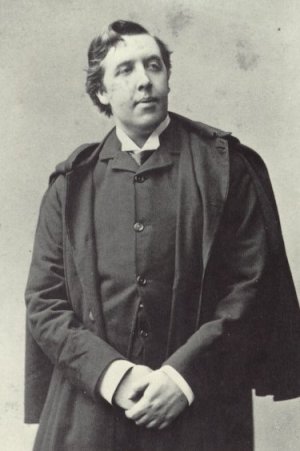
Wilde's plays served as a catalyst in creating the modern era. Collectively they "forced Victorian society to re-examine its hypocrisies and delineated with wit and humour, the arbitrariness of many moral and social taboos which, to the unreflective Victorian eye, appeared to be eternal.
In 1895 the eigth Marquess of Queensberry, considered quite mad by even members of his immediate family, culminated his persistent public harrassment of Wilde for his off-and-on sexual relationship with his son Lord Alfred Douglas. A libel suit filed by Wilde against the Marquess backfired; the Marquees was acquitted and Wilde's not too well camouflaged desire for men landed him two years of hard labour. Wilde resisted the urgings of his friends to leave for the Continent, where a more tolerant sexual mores prevailed, saying he should accept with dignity the consequences
of his actions. The supreme vice is shallowness.
While in prison he wrote a 30,000 word letter to Douglas, published after his death with the title De Profundis, that is regarded as possibly being his most important and mature statement on life and art in general and his own life and art in particular. In concluding, he tells Douglas, "You came to me to learn the Pleasures of Life and the Pleasures of Art. Perhaps I am chosen to teach you something much more wonderful, the meaning of Sorrow, and its beauty."
After his release from prison, Wilde left England and wandered around Europe for the last three years of his life. He was a broken man who sank deeper into a reckless life of sex and absinthe which neither he nor long-time friends could extricate him. His one noteworthy piece from this period is The Ballad of Reading Gaol, a gripping account of prison brutality based on his own harrowing experiences with a plea for prison reform.
He endured his final days in poor health and living on borrowed money and the kindness of sympathetic friends and hotel managers. In 1900, in Hotel d'Alsace in Paris, he died of cerebral meningitis.
And alien tears will fill for him
Pity's long broken urn
For his mourners will be outcast men
And outcasts always mourn
Stephen Fry's film "Wilde" has been out on video for some time now. If you are a Wilde fan, or a Stephen Fry fan, I must highly recommend it as a viewing choice. It is an excellent film, with excellent performances.
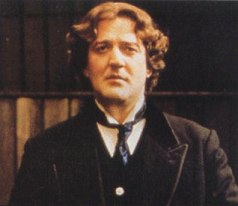
Wilde
(review by Tom Gliatto in People Magazine, 5/11/98)Starring Stephen Fry, Jude Law
Oscar Wilde, Victorian wit and playwright, is enjoying a boom. There are already two plays about him in New York (one with Liam Neeson), and now this movie, which - with apologies to Wilde's masterpiece - is more earnest than important. Wilde, in addition to sketching in his fond but negligent family life (he had two children), covers the basics of the writer's disastrous gay love affair with a spoiled aristocratic brat, Alfred Douglas (Law); his bizarre libel suit against the boy's father (who sent Wilde a misspelled note calling him a "somdomite"); and his subsequent imprisonment for indecency.
As Wilde, Fry is physically ideal - large yet delicate. He delivers a
stream of epigrams ("The only way to get rid of a temptation is to yield to it") with understated grace. He endures catastrophe with dignified sorrow. It's one of many good performances here (Vanessa Redgrave is quite touching in a small part, Wilde's impassioned, romantic mama). But the movie reduces Wilde to a martyr. Big, lovable and crushably soft, he's H.R. Pufnstuf. (R)
Bottom Line: More mild than Wilde
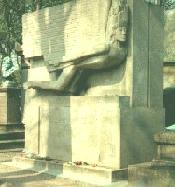
Oscar Wilde's memorial in Pere Lachaise
(memorial image: WWW Cemetery)
Other Wilde Stuff
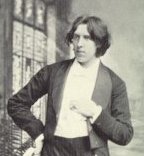
- The Ballad of Reading Gaol
- Symphony in Yellow
- The Harlot's House
- Requiescat
- Ave Imperatrix
- Helas!
- A selection of my favorite Wilde quotes
- Monty Python's Oscar Wilde Sketch
GROSS INDECENCY: The Three Trials of Oscar Wilde... Website for the hit play
Wilde's Poems
Selected Short Stories And Poems
Visit Oscar's memorial in Pere Lachaise cemetery
The University of Dublin, Trinity College
Irish History Web Site
National Archives of Ireland... Family History and Geneology
A bit of Bernard Shaw... from Alex Steedman's website
 |
The Pleasure Dome is being erected in earnest by |